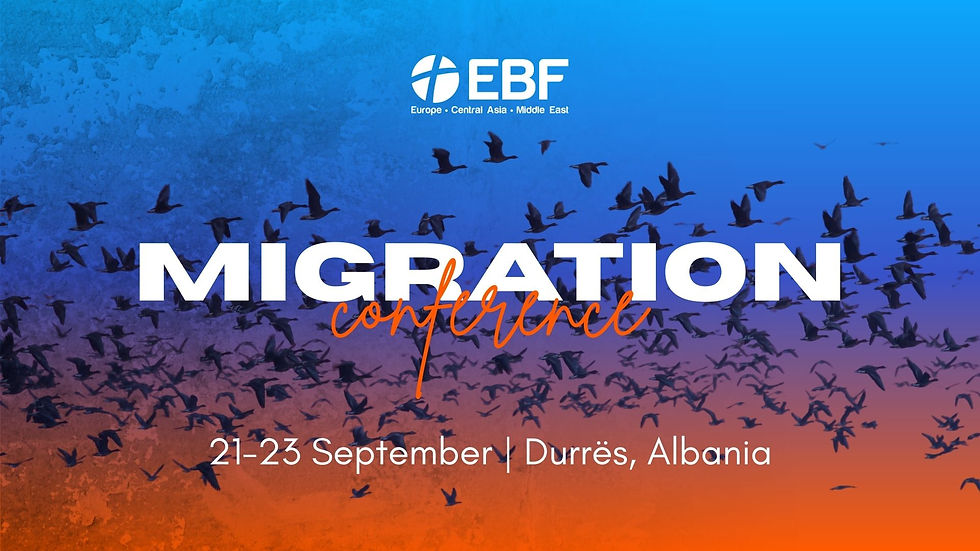‘Declaration of Humanity’ opposes all forms of sexual violence
- Nov 19, 2020
- 4 min read
This week the UK Government has published a ‘Declaration of Humanity’ by Faith and Belief Leaders in the UK, to condemn all forms of sexual violence, to urge that survivors of such abuse are given a voice and to ensure that perpetrators are brought to justice.
This has been led by a member of the UK Parliament’s House of Lords, Lord Ahmad, the Prime Minister’s Special Representative on Preventing Sexual Violence in Conflict (PSDVI). He developed this Declaration with the UK-based PSVI Faith and Belief Leaders Working Group.
The Declaration has received significant support globally from faith and belief leaders, community leaders, and faith-based organisations in a range of countries including Iraq, Kosovo, Sri Lanka, Sierra Leone and the Vatican.
After the words of the Declaration, there is a reflection on it by UK Baptist minister and biblical scholar, Dr Helen Paynter, who has written extensively on this subject.
Declaration of Humanity
Based on our fundamental belief that all persons have innate human dignity and value, we:
condemn utterly all acts of conflict-related sexual violence towards any person, at any time, and in any circumstance, and will encourage those under our care and others in the community to do the same
affirm that all survivors of sexual violence in conflict, and children born of conflict-related rape are innocent, are of equal worth and value to all people. They are to be fully accepted, respected, and honoured
refute the stigma associated with survivors of conflict-related sexual violence and children born of conflict-related rape, and deplore its use as a weapon that instigates the breakdown of families and communities and we will oppose and condemn all symptoms of stigma in our communities
acknowledge and honour survivors’ independence, courage, hope and resilience, and the right to shape their own futures
We will:
do all in our power to prevent conflict-related sexual violence and protect all persons vulnerable to such violence, including marginalised minority groups and those of other faiths or beliefs, recognising that adherence to a faith or belief can itself result in additional vulnerability
work to dismantle harmful interpretations of faith or belief and harmful cultural norms that may be used to condone or commit acts of sexual violence
support the voices of survivors, stand for justice to prevent oppression, violence and false accusations, and speak out to defend survivors and their right to justice while holding accountable those who have perpetrated crimes
foster unity between survivors and their communities to support effectively their social integration and their economic and psychological development
seek to understand the experiences of survivors and their needs, taking care to avoid their retraumatisation
utilise media, religious discussions, educational materials, texts and all other platforms of our faith or belief community to empower survivors, recognising the resources of our community and that faith or belief can be a source of strength for survivors
Dr Helen Paynter’s reflection
The Declaration of Humanity by Leaders of Faith and Leaders of Belief, published on 17th November 2020, makes a welcome statement from a wide platform of religious and non-religious perspectives about the global pandemic of sexual violence. For far too long sexual violence against both women and men has been a secret, unspeakable, crime, concealed by both the shame felt by victims, and by structures of collusion. The recent #MeToo movement has helped to open up conversations about these crimes; and publication of books like Christina Lamb’s 'Our Bodies, Their Battlefield' has helped to bring the war crime of rape into the global spotlight. Mass war rape is now rightly recognised as an act of genocide.
It is to the lasting shame of the Christian church that at diverse times and in diverse ways, it has colluded with sexual violence. This includes the abuse of minors and vulnerable adults within churches, and the domestic abuse of women and sometimes men at the hands of their partners. Sometimes the Bible has been weaponised for such purposes, including promulgating the misconceived idea that forgiveness entails sheltering an abuser from the criminal justice system, or requires an abuse victim to allow an abusive partner to continue to have intimate access to her. Such teaching is entirely contrary to the broad and plain intention of scripture, which from its earliest chapters is committed to the flourishing of all people, male and female.
Further, within many parts of the global church there is a resurgent preoccupation with dominant, aggressive and sometimes misogynistic masculinity. This often finds its outworking in patriarchal and hegemonic systems of society, church governance, and home management. It flies in the teeth of the plain example of Jesus Christ, whose gentleness and respect for women marked him out, and who dignified the weak, the vulnerable, and the outcast.

The Declaration of Humanity is particularly welcome because it does not merely make a statement, but also makes a commitment to work both preventatively and reparatively towards human flourishing, freedom and justice in these matters. Christians will be proud to join with people of other faiths and belief systems to work together towards lasting change and a safer world for all.
Dr Helen Paynter is a UK Baptist minister, biblical scholar, and director of the Centre for the Study of Bible and Violence, a hub for postgraduate study and activism, working to bring peace and clarity in the areas where the Bible is being weaponised to cause harm to others. She has recently published ‘The Bible Doesn’t Tell Me So – Why you don’t have to submit to domestic abuse and coercive control’.



Comments